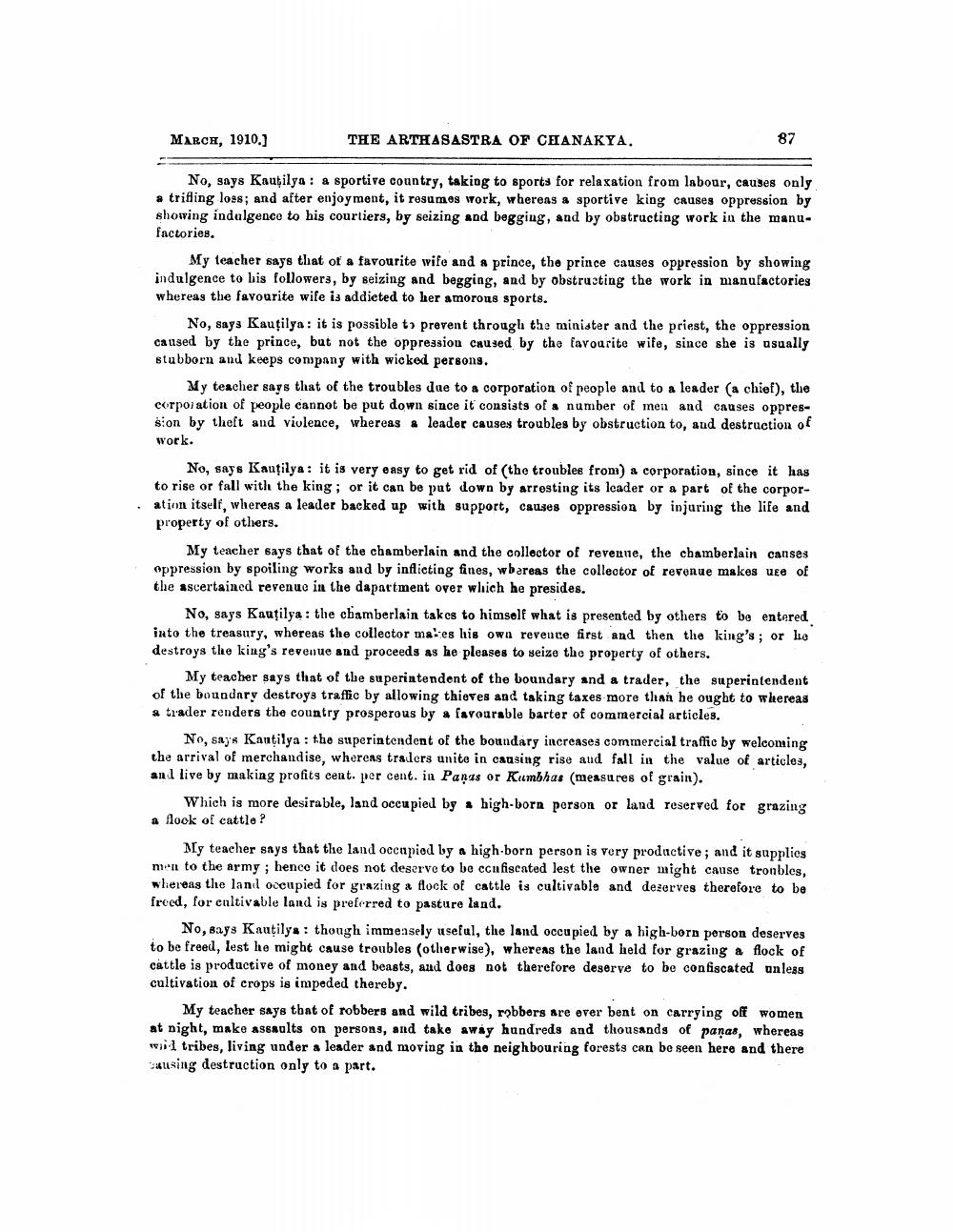________________
MARCH, 1910.)
THE ARTH ASASTRA OF CHANAKYA.
87
No, says Kautilya: a sportive country, taking to sports for relaxation from labour, causes only. a trifling loss; and after enjoyment, it resumes work, whereas a sportive king causes oppression by showing indulgenco to his courtiers, by seizing and begging, and by obstructing work in the manufactories.
My teacher says that of a favourite wife and a prince, the prince causes oppression by showing indulgence to lis followers, by seizing and begging, and by obstrusting the work in manufactories whereas the favourite wife is addieted to her amorous sports.
No, says Kautilya: it is possible to prevent through the minister and the priest, the oppression caused by the prince, but not the oppression caused by the favourite wife, since she is asually stubborn and keeps conspany with wicked persons.
My teacher says that of the troubles due to a corporation of people and to a leader (a chief), the corporation of people cannot be put down since it consists of a number of men and causes oppression by theft and violence, whereas leader causes troubles by obstruction to, and destruction of work.
No, says Kautilya: it is very easy to get rid of the troubles from) a corporation, since it has to rise or fall with the king; or it can be put down by arresting its leader or a part of the corpor·ation itself, whereas a leader backed up with support, causes oppression by injuring the life and property of others.
My teacher says that of the chamberlain and the collector of revente, the chamberlain canses oppression by spoiling works and by inflicting fines, wbareas the collector of revenue makes use of the ascertained revenue in the dapartment over which he presides.
No, says Kautilya: the chamberlain takes to himself what is presented by others to be entered into the treasury, whereas the collector makes his own revence first and then the king's; or lo destroys the king's revenue and proceeds as he pleases to seize the property of others.
My teacher says that of the superintendent of the boundary and a trader, the superintendent of the boundnry destroys traffic by allowing thieves and taking taxes more than he ought to whereas a trader renders the country prosperous by a favourable barter of commercial articles.
No, says Kautilya: the superintendent of the boundary increases commercial traffic by welcoming the arrival of merchandise, whereas traders unite in causing rise and fall in the value of articles, and live by making profits cent. per cent. in Panas or Kumbhas (measures of grain).
Which is more desirable, land occupied by high-born person or land reserved for grazing a fook of cattle?
My teacher says that the land occapied by a high-born person is very productive; and it supplies men to the army; hence it does not deserve to be confiscated lest the owner might cause tronbles, whereas the land occupied for grazing a flock of cattle is cultivable and deserves therefore to be froed, for enltivable land is preferred to pasture land.
No, says Kautilya : though immeasely useful, the land occupied by a high-born porson deserves to be freed, lest he might cause troubles (otherwise), whereas the land held for grazing a flock of cattle is productive of money and beasts, and does not therefore deserve to be confiscated unless cultivation of crops is impeded thereby.
My teacher says that of robbers and wild tribes, robbers are over bent on carrying off women at night, make assaults on persons, and take away hundreds and thousands of paņas, whereas W tribes, living under a leader and moving in the neighbouring forests can be seen here and there
using destruction only to a part.




